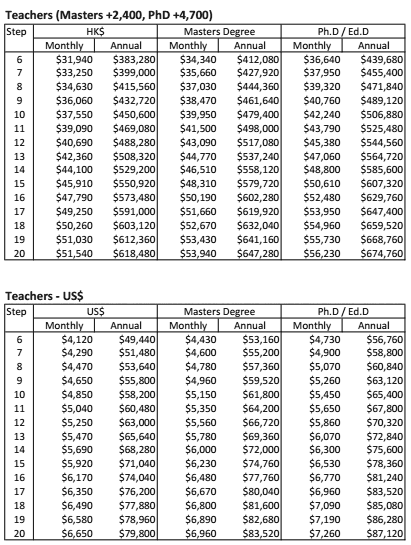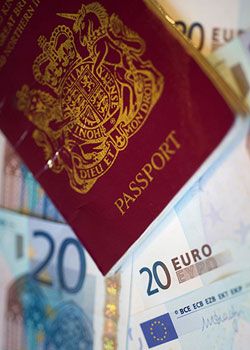Teaching Jobs Overseas / JOYJOBS.COM
Webservers: LiquidWeb, Inc. Michigan / Arizona USA ![]()
Support: Portland Oregon USA ![]()
All rights reserved © 1996-2022
In addition to the salary, your contract will include benefits. The common benefits include:
![]() Airfares (employee and dependents)
Airfares (employee and dependents)
![]() Settling-in and housing allowances
Settling-in and housing allowances
![]() Paid utilities and transportation
Paid utilities and transportation
![]() Tuition for dependents
Tuition for dependents
![]() Health / life insurances
Health / life insurances
![]() Shipping/baggange allowance
Shipping/baggange allowance
![]() Paid vacations, holidays and personal days
Paid vacations, holidays and personal days
![]() Professional development
Professional development
![]() Contract resigning and completion bonuses
Contract resigning and completion bonuses
![]() Tax free status and a retirement plan
Tax free status and a retirement plan
When comparing packages, always consider the cost of living in your prospective country. There is usually a substantial difference between cities as well. A high salary in an expensive location, without benefits, is often a worse offer than a lower amount with full benefits.
For example, when we taught in Bulgaria, the cost of living was very low at the time. The school paid a typical international salary, which was excessive by the local standards. Suddenly, even the most fantastic experiences were affordable! Compared to Singapore or Hong Kong, the pay was low. In Sofia, it allowed you to live like a king!
The next job was in Japan and the situation changed completely. As it turned out, Japan was expensive. Although Japan was one of the most exotic countries we ever experienced, the cost of living was high. One had to budget.
On the positive side, we were paid in Japanese Yen. As the US dollar had been sinking the paycheck in JP Yen began to look more and more attractive. It was like getting a raise every month, confirmation of the Zen idea that the universe is always in a perfect balance between the Yin and the Yan.
How do the schools offer "tax-free" salaries?
Technically, all US citizens must pay taxes while abroad but as long as you make under the cap you owe no tax. (US$95,000 per person in 2019; the Congress increases it every year).
If your salary is under US$95,000 you do not owe any tax to the IRS, hence "tax-free". Obviously, it does not exclude local taxes. Local taxes can be minimal, and in many cases your school picks up the tab. More often, though, the first 2 years there is no tax at all or it is fairly low.
Once you overextend your tax-free period, many countries require that you start paying the social security tax. It reduces your income substantially. This is an additional incentive for teachers to move.
In spite of that, the quality of life is often so high that you may stay anyway. In Japan, for example, many our teachers have stayed for 10 years and more.
—Do you cover interview travel expenses?
Yes, if you incur travel costs please let your interviewer know and they will pass you an expenses reimbursement form – please return to BST with receipts.
—What does the school benefits package cover?
The benefits package for teachers, in addition to salary, is as follows:
![]() Additional 5% of salary as a pension contribution
Additional 5% of salary as a pension contribution
![]() Subsidised accommodation
Subsidised accommodation
![]() Annual home leave flight
Annual home leave flight
![]() Relocation flight and shipping to and from Japan
Relocation flight and shipping to and from Japan
![]() Health insurance
Health insurance
![]() PC purchase allowance
PC purchase allowance
![]() Daily commuting allowance
Daily commuting allowance
![]() Subsidised places at BST for dependent children
Subsidised places at BST for dependent children
—What does the school cover in terms of relocation?
We provide a single economy class air ticket from the UK (or where you are recruited from) to Japan when you join and also a single economy class ticket back to the UK when you leave – this is for teachers and dependent family members.
We also provide a generous relocation allowance for belongings based on a volume shipment from your point of recruitment to Japan and back again. The volume differs for single teachers and families.
(The British School in Tokyo Recruitment FAQs)
![]() I want to thank you for the wonderful job you've done with our webpage resume. How fast and professional.
I am such a huge fan of your website and the whole joyjobs system. This whole experience with you has made our dream.
—Stephen B.
I want to thank you for the wonderful job you've done with our webpage resume. How fast and professional.
I am such a huge fan of your website and the whole joyjobs system. This whole experience with you has made our dream.
—Stephen B.
![]() You are amazingly helpful, and so quick to respond. I absolutely love your company, and recommend it to everyone who is in this line of work. —Rebecca K.
You are amazingly helpful, and so quick to respond. I absolutely love your company, and recommend it to everyone who is in this line of work. —Rebecca K.


(Hong Kong International School)
![]()
Private pension (5 percent contribution from employee, 10 percent from the School)
Private medical insurance
Financial assistance to travel home every two years
Generous budget for professional development
Tuition fee waiver for dependent children
Subsidized daily lunch
Life insurance
Income Replacement Insurance for prolonged absence
Down-payment assistance for property purchase
The opportunity to apply for sabbatical leave
Use of school fitness center
Opportunities to travel in Europe, the Middle East, North Africa and farther afield through participation in school activities.

American School of Budapest, Hungary
| Salary: | Per Teacher's Salary Scale |
| Retirement: | 5% matching contribution increased by .5% each year, up to 10% in year 10 |
| Professional Development: | $1,000 |
| Medical Insurance: | CIGNA |
| Transportation to Budapest: | Airfare for Teacher and dependents |
| Shipping Allowance: | 600 lbs airfreight plus 300 lbs per dependent |
| Housing/Utilities: |
$935/mo plus $345 per child |
| Home Leave: |
Annual return airfare after second year |
| Sick Leave: |
12 days/120 cumulative |
| Personal Leave: |
2 days |
| Bereavement Leave: |
5 days plus airfare |
| Tuition for Children: | Provided |
| Allowance for Children: |
Airfare for college students |
